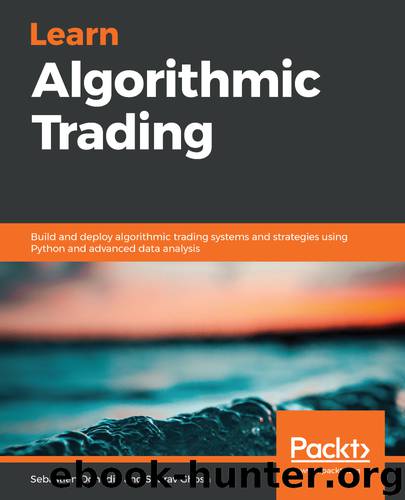Learn Algorithmic Trading by Sebastien Donadio

Author:Sebastien Donadio
Language: eng
Format: epub
Tags: COM018000 - COMPUTERS / Data Processing, COM032000 - COMPUTERS / Information Technology, COM051300 - COMPUTERS / Programming / Algorithms
Publisher: Packt
Published: 2019-11-07T11:05:17+00:00
Differentiating between the types of risk and risk factors
Risks in algorithmic trading strategies can basically be of two things: risks that cause money loss and risks that cause illegal/forbidden behavior in markets that cause regulatory actions. Let's take a look at the risks involved before we look at what factors lead to increasing/decreasing these risks in the business of algorithmic trading.
Risk of trading losses
This is the most obvious and intuitive one—we want to trade to make money, but we always run through the risk of losing money against other market participants. Trading is a zero-sum game: some participants will make money, while some will lose money. The amount that's lost by the losing participants is the amount that's gained by the winning participants. This simple fact is what also makes trading quite challenging. Generally, less informed participants will lose money to more informed participants. Informed is a loose term here; it can mean participants with access to information that others don't have. This can include access to secretive or expensive or even illegal information sources, the ability to transport and consume such information that other participants don't have, and so on. Information edge can also be gained by participants with a superior ability to glean information from the available information, that is, some participants will have better signals, better analytics abilities, and better predictive abilities to edge out less informed participants. Obviously, more sophisticated participants will also beat less sophisticated participants.
Sophistication can be gained from technology advantages as well, such as faster reacting trading strategies. The use of a low-level language such as C/C++ is harder to develop software in but allows us to build trading software systems that react in single-digit microseconds processing time. An extreme speed advantage is available to participants that use Field Programmable Gate Arrays (FPGAs) to achieve sub-microsecond response times to market data updates. Another avenue of gaining sophistication is by having more complex trading algorithms with more complex logic that's meant to squeeze out as much edge as possible. It should be clear that algorithmic trading is an extremely complex and competitive business and that all the participants are doing their best to squeeze out every bit of profit possible by being more informed and sophisticated.
https://news.efinancialcareers.com/us-en/291459/xr-trading-2016 discusses an example of trading losses due to decreased profitability, which occurs due to competition among market participants.
Download
This site does not store any files on its server. We only index and link to content provided by other sites. Please contact the content providers to delete copyright contents if any and email us, we'll remove relevant links or contents immediately.
The Mikado Method by Ola Ellnestam Daniel Brolund(23567)
Hello! Python by Anthony Briggs(22702)
Secrets of the JavaScript Ninja by John Resig Bear Bibeault(21523)
Kotlin in Action by Dmitry Jemerov(20566)
Dependency Injection in .NET by Mark Seemann(20488)
The Well-Grounded Java Developer by Benjamin J. Evans Martijn Verburg(20382)
OCA Java SE 8 Programmer I Certification Guide by Mala Gupta(19535)
Algorithms of the Intelligent Web by Haralambos Marmanis;Dmitry Babenko(18333)
Grails in Action by Glen Smith Peter Ledbrook(17458)
Adobe Camera Raw For Digital Photographers Only by Rob Sheppard(16975)
Test-Driven iOS Development with Swift 4 by Dominik Hauser(11239)
Becoming a Dynamics 365 Finance and Supply Chain Solution Architect by Brent Dawson(8071)
Microservices with Go by Alexander Shuiskov(7841)
Practical Design Patterns for Java Developers by Miroslav Wengner(7739)
Test Automation Engineering Handbook by Manikandan Sambamurthy(7703)
Angular Projects - Third Edition by Aristeidis Bampakos(7182)
The Art of Crafting User Stories by The Art of Crafting User Stories(6642)
NetSuite for Consultants - Second Edition by Peter Ries(6561)
Demystifying Cryptography with OpenSSL 3.0 by Alexei Khlebnikov(6326)
